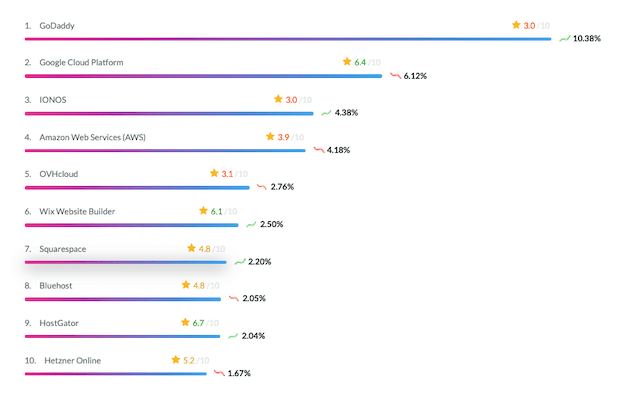How often do you put yourself in your client’s shoes and still can’t find out what they want? You need web hosting for your client to make their website accessible to the public. But finding a right hosting server that can fit your client’s requirements might take a bit of extra research and understanding.
Keep reading to learn more about hosting servers and how to choose the right one for your client.
Editor's note: GoDaddy now has a hosting centre located in India, enabling faster load times and better security for customer websites. You can read more here.
Types of hosting suitable for different clients
Not sure how to go about choosing the right hosting server for your client? Start by reading the descriptions below to get a quick breakdown of the different types that are available.
1. Shared hosting
If your client is starting a new website, a shared hosting server could fit the bill. In a shared hosting environment, a single server is used by dozens, hundreds, or even thousands of people.

Most hosting providers offer inexpensive shared hosting plans.
A sharp increase in traffic could cause issues for any website on the shared server, but this type of hosting can suit clients with basic needs.
You can always shift your client’s website to a VPS server, once it starts generating a lot of traffic.
2. VPS hosting
A virtual private server (VPS) is similar to a shared hosting environment in that numerous sites are hosted on the same server. The main distinction is that each account is granted exclusive access to specified system resources.
If your client’s website traffic is increasing and they need more resources and control over the server, a VPS is an excellent option — especially if they don't want to spend on dedicated hosting.
Medium- to large-sized firms and online retailers opt for VPS because of its ability to handle more traffic.
Its exclusive access means that even if another site on the same server is experiencing high traffic, it will not cause others on the server to slow down. So, for clients with a heavy customer base, it’s best to choose a VPS for smooth performance.
3. WordPress hosting
If your client doesn’t have a hardcore customer base and is not expecting a lot of flexibility on their website, then go for WordPress hosting server.
A WordPress hosting service provides many features like:
- Simple site setup
- Dependable staging environment
- Fine-tuned and simple-to-use dashboards
- Improved caching
- Guaranteed security
It’s worth considering if you need something safe, effective and dependable.
Related: Choosing the best WordPress hosting plan
4. Cloud hosting
Cloud hosting allows users to access the resources of several servers on the same network and is better equipped at resisting hacker assaults. This approach is best suited for big corporations because it already comes equipped with included security measures.
Securing the cloud is the main focus of cloud hosting.
This ensures that data is safe and secure across all internet infrastructure, apps and platforms.
Although this type of hosting server is relatively new, it offers a great middle ground between VPS and dedicated servers. Cloud hosting plans are cheaper and generally more stable than VPS and dedicated hosting servers. High scalability and performance in VPS and dedicated hosting will demand a higher price.
If your client is looking for a solution that can handle more traffic, cloud hosting is a suitable choice.
Related: How to add website maintenance to your web services
5. Dedicated hosting
There are two website types that will benefit from dedicated server hosting:
- Ones that need a lot of resources
- Ones that are concerned about data security
If a client is finicky about security, your best bet is go with a dedicated hosting server.
Additionally, dedicated hosting comes with a greater choice of configuration options, such as:
- The quantity and kind of RAM supplied
- OS installed
- Total storage space and much more
Being the only user on the server eliminates any complications and gives you more freedom.
There are certain hosting platforms that provide all of the hosting options listed above. These will allow you to pick and choose what your client wants. Be sure to choose a web hosting server that is reputable and has a large number of customers.
Here are the largest web hosts in the world by market share:

Editor’s note: GoDaddy’s Hosting plans are affordable and offer reliable features that fit a range of clients’ needs, from basic to high-end.
Key features to consider before choosing a hosting server
When searching for the best web hosting for a client, there are a few factors to keep in mind. We’ll break down each one below.
Cost
Always compare the budget of your client with the cost of the hosting. There are a number of budget-friendly hosting plans that provide all of the necessary functionality without putting a dent in your client’s wallet.
Loading speed
With so many hosting servers to select from, it’s important to think about loading speed as a key factor. Users are unlikely to stick around if a page takes too long to load.
About 47 % of users expect a website to load in little more than two seconds.
Having a fast-loading website not only benefits your user experience but can also boost your search rankings on Google.
Storage capacity
Compared to an e-commerce business, a simple one-page website takes up less space. So, if you have a client who is running a basic website, you don’t need to spend money on high-end web hosting plans.
Performance
When we discuss ‘performance,’ what we really mean is ‘speed.’ And as we mentioned earlier, finding a hosting server that loads web pages quickly provides the greatest possible user experience for the customers.

But performance is a lot more than just speed. It also depends on other key factors like:
- Bandwidth
- Server technology
- Scalability
Make sure to check how well the hosting server handles the above factors before finalizing one plan.
Customer support
Reliable technical help should not be underestimated. It's critical to compare the customer support that’s provided by various hosting companies.
In terms of customer assistance, lower-level plans tend to be more hands-off. But pricier managed plans tend to provide additional premium services.
User ratings
User ratings can also play a big role in order to decide which hosting is more reliable. Some claim to have a 99.9% uptime but end up giving completely opposite results. So take your time and read the reviews before making a decision.
What exactly is a hosting server?
For those who are new to web development, a hosting server (or web hosting server) is like a house that holds your website, along with other important details like:
- Data
- Programs
- Services
You can access an internet server from any location, and it often includes tools that’ll help you run a functioning website with minimal hassle.
Although there are many web hosting providers popping up these days, it can be tough to know which one is the right choice for you and your client. Most will provide identical basic services, while others focus on less competitive (and possibly more profitable) specialized features.
In closing, let’s revisit the overall importance of a hosting server.
Why is good hosting important for a website?
When you sign up for a web hosting service, you're paying for server space that you can use to upload and store all of your client’s website data and content.
A professional and trustworthy web hosting server makes sure that all their needs are covered.
Relying on a subpar hosting provider that is unable to provide adequate performance might lead to bad repercussions.
Summary
The distinctions between various types of hosting servers are not always straightforward. That’s why it’s important you understand your client’s expectations before you decide.
Pay attention to the details that will benefit your client’s business size and budget, along with key features that will elevate the overall user experience on their websites.
Many web hosting providers are cognizant of what clients want and offer hosting packages that are customizable.
Nonetheless, you should always dedicate comprehensive research before you commit. Consider all of the requirements outlined in this article before you commit and keep your client's needs top of mind.
________________________________
Got a few minutes? (Probably not.)
Fumbling for login credentials, running endless updates, explaining product purchases... No thanks. We built the Hub from GoDaddy Pro to save you an average three hours per month for every client site you maintain.






